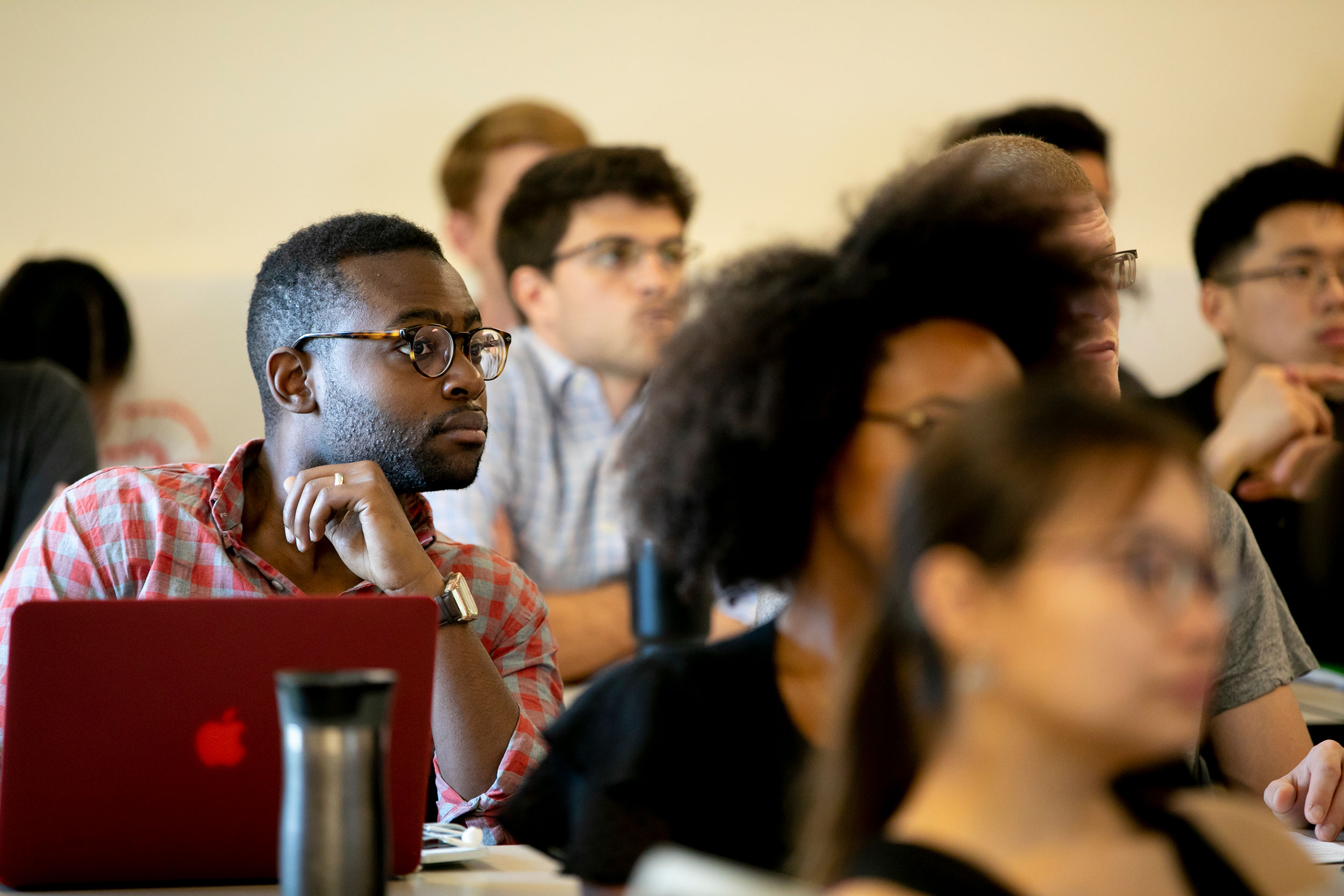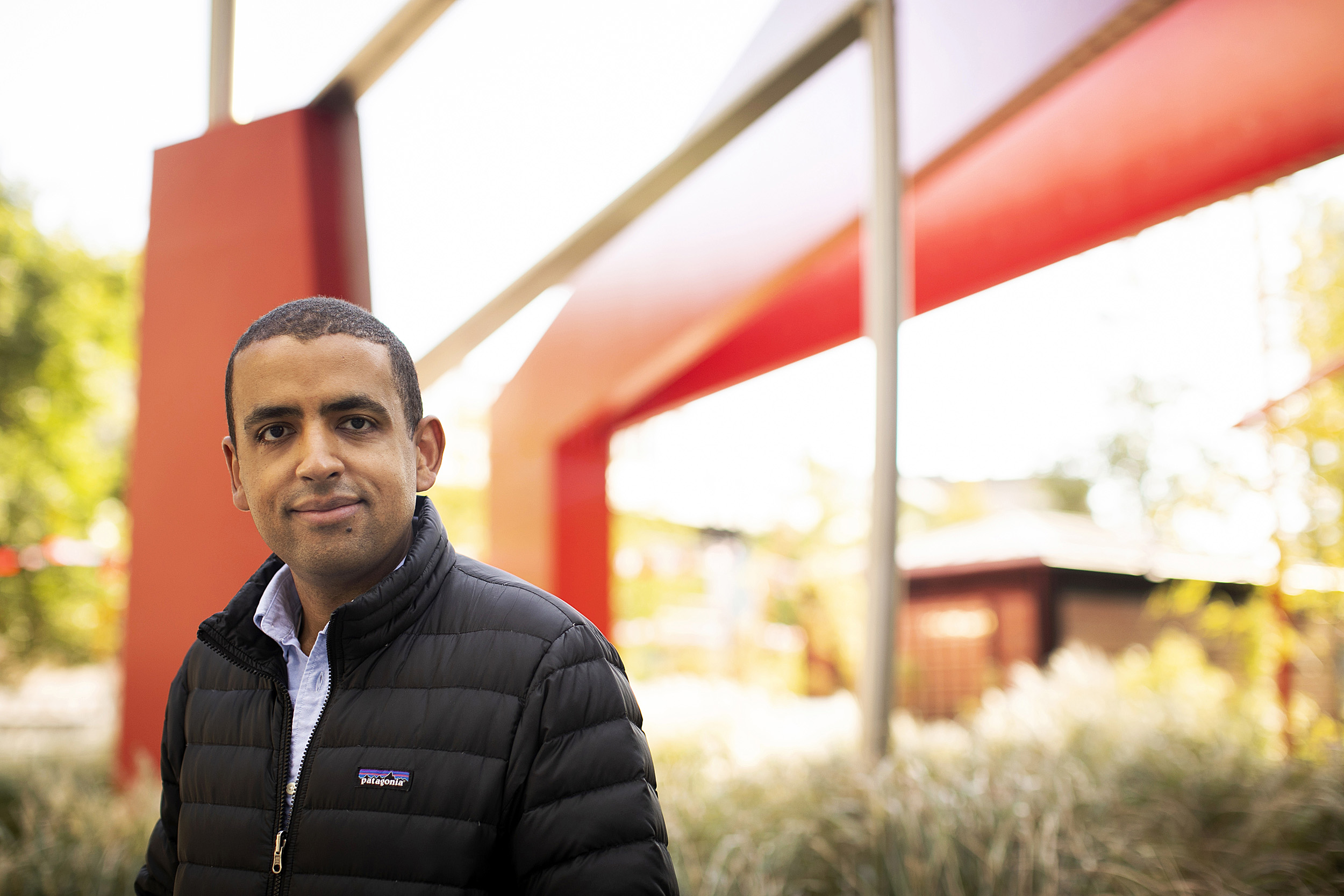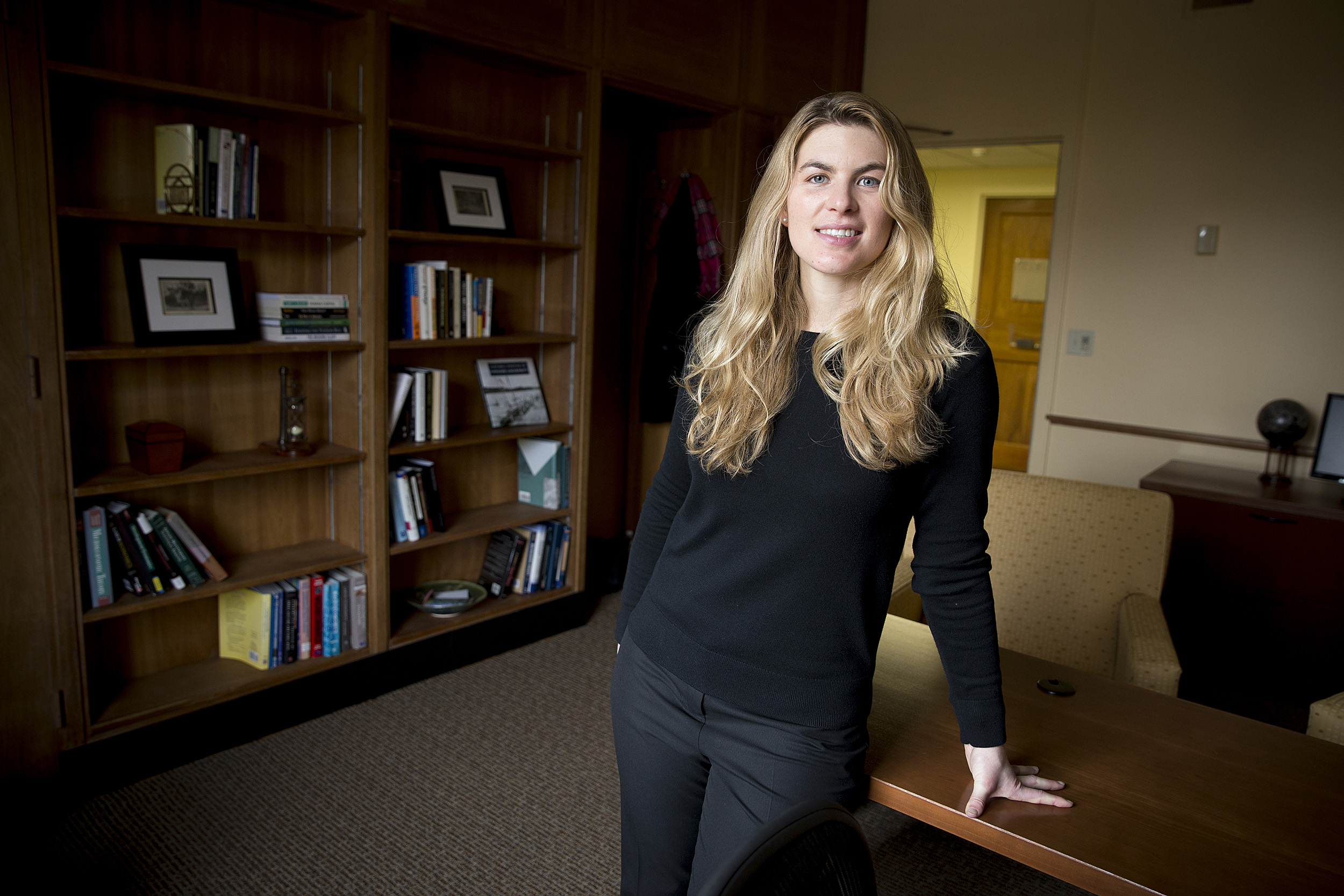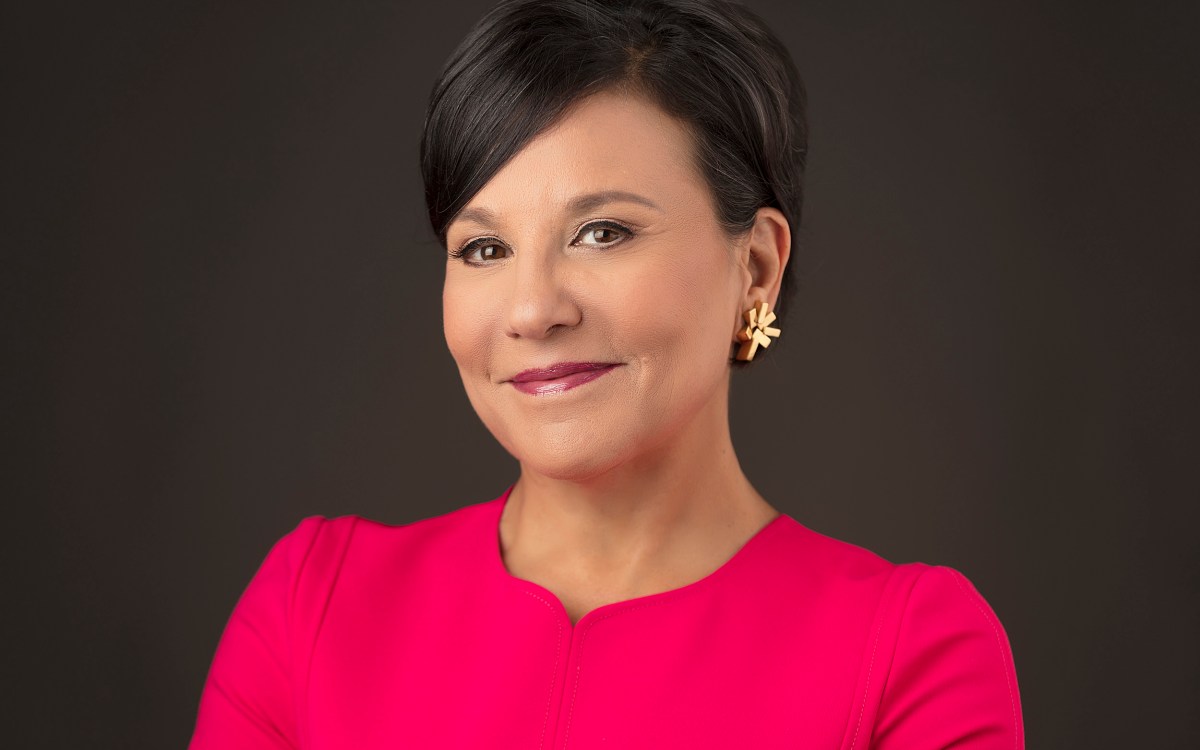
Student in an economics class at Harvard.
Rose Lincoln/Harvard Staff Photographer
Gift that promises to keep on giving
Economics faculty says new facility will foster greater collaboration, innovation, and inclusivity
Solving many of the world’s most pressing issues has been a foundational focus for Harvard’s Department of Economics, and its professors’ range and depth of research has resulted in dozens of coveted fellowships and an impressive award list that includes multiple MacArthur Awards, Clark Medals and 11 Nobel Prizes.
This has been true for faculty who are breaking ground in more traditional areas of research like fiscal policy as well as those taking the newer approach of harnessing the power of big data to better understand ground-level economic inequality. With yesterday’s announcement of a transformational gift to bolster the work of the department and provide a new home for faculty and students, Harvard Economics is now poised not only to continue its long legacy of success, but also to build an even more inclusive future. The new building will gather faculty, graduate students, and undergraduates under the same roof, fostering greater collaboration and innovation across the department and with others at the University.
“A lot of people are working on projects that are not just academically interesting and rigorous, but that they hope will change the world — that will affect policy, that will affect the way that firms and governments think about things” said Amanda Pallais, a professor in the department. “Harvard economics is a place where people do very rigorous work, but they’re also doing very impactful work, and they’re tackling the big questions.”
Department Chair Ed Glaeser, the Fred and Eleanor Glimp Professor of Economics, added: “In intellectual question after intellectual question, Harvard economists have played leading roles.”
The field’s shift to big data comes the need for bigger teams — and, as a result, spaces designed for this new era of research, said Isaiah Andrews, recent winner of the prestigious Clark Medal, awarded annually to an American economist under the age of 40.
Stephanie Mitchell/Harvard file photo

Glaeser said the strength and rich history of the department makes him confident of the range of possibilities that a new building invites. He points to the work of Amartya Sen, who won the Nobel in 1998 for his study of the economics of poverty; Robert J. Barros, who did fundamental research on the determinants of economic growth; and Matthew Rabin, one of the pioneers of behavioral economics, which applies psychological insights to help explain human decision-making.
Also of note: Jim Stock’s recent work on developing good climate policy from an economic standpoint; the late Alberto Alesina’s work on why the U.S. doesn’t have a European-style welfare state; and the research of Gita Gopinath, who currently serves as chief economist at the International Monetary Fund.
With the benefits promised by the new facility, Glaeser says he is eager to see how the next generation of faculty carries the department forward, both in terms of the social issues they focus on as well as the tools and methods they use for research.
One of the biggest shifts in the field over the past decade has involved the analysis of giant datasets, made possible by the greater digitization of information and a vast increase in computing power. It has opened the door to close examinations of previously understudied areas such as gender gaps in the labor market or the long-term effects of historical economic policies and institutions.
The approach has been useful for Pallais, whose work centers around the performance of labor markets and the educational investment decisions of disadvantaged and socially excluded groups. Specifically, one of the things she looks at are the barriers that prevent workers, especially people of color and women, from achieving their potential.
In the new building, access to more ideas and voices can foster increased collaboration. Pallais looks forward to connecting more easily with people who are studying similar questions from different angles, disciplines, and even across campus.
“A lot of people are working on projects that are not just academically interesting and rigorous, but that they hope will change the world …,” said Professor of Economics Amanda Pallais.
Rose Lincoln/Harvard file photo

“It’s going to allow all of us to sit in the same space,” Pallais said. “It will allow for more impromptu conversations. It’ll be easier to stop by somebody’s office with a question or to talk about what we’re working on.”
That kind of collaboration will be critical for econometrician Isaiah Andrews, who develops statistical tools that help other economists overcome obstacles in their research.
“A lot of my work is focused around thinking about whether a lot of the methods we’re currently using in the field are reliable, what the shortcomings of those methods are, and how we can improve them,” said Andrews, recent winner of the prestigious Clark Medal, awarded annually to an American economist under the age of 40. “Because my work is largely motivated by challenges that folks doing research in empirical economics are running into, talking with my colleagues and having a sense of what folks are working on and what challenges they are running into — that is a very important input.”
Andrews pointed out that with the field’s shift to big data comes the need for bigger teams — and, as a result, spaces designed for this new era of research.
One researcher who came to Andrews’ mind is frequent collaborator Raj Chetty, William A. Ackman Professor of Public Economics and the director of Opportunity Insights, a Harvard-based institute of social scientists and economic policy analysts that harnesses big data for policy solutions.
Chetty, 2013 Clark Medal winner, looks at massive economic, geographic, and demographic datasets to try to figure out how such variables as race, education, and income affect lives and futures of individuals in neighborhoods across the country. In the new building, Chetty’s team will for the first time be brought together in the same place with their department collaborators and with other large labs like the Social Economics Lab, which conducts large-scale online surveys to understand how views on economic and social policies emerge.
Along with excitement over how the gift will help them continue their innovative work, faculty like Chetty, Pallais, and Andrews say they expect it will foster a more inclusive and diverse community of economists.
“Often the best solutions come from places that we haven’t looked before,” Chetty said. “I think that naturally leads to diversity. It leads us all to do genuinely better work because you get exposed to ideas that are going to be really helpful in tackling these various social problems. I think this building can really be the place at which this happens.”
Chetty says Harvard has often been at the vanguard of leading shifts in the field. A drive toward more inclusivity should be no different, especially as the field continues branching out to take on increasingly dire and complex societal issues like the persistence of income inequality and public health emergencies like COVID-19.
“Often the best solutions come from places that we haven’t looked before. I think that naturally leads to diversity,” said Raj Chetty, William A. Ackman Professor of Public Economics.
Stephanie Mitchell/Harvard file photo

Chetty points to his course Econ 50: Using Big Data to Solve Economic and Social Problems. Targeted to first years and sophomores — and highly popular — it gives students an introduction to using the tools of modern data science, economics, and statistics to tackle such questions as: Why are there racial disparities in America?
Focused more on effective, real-life solutions to social problems, Chetty says the 500-person course shows an equal split between men and women and more students from underrepresented backgrounds than in other economics classes.
“That shows you how teaching can itself make the field more inclusive when done in the right way,” he said.
Chetty hopes the same potential will be realized in a new space that will be designed from its foundation to be more welcoming and encouraging of increased interaction between faculty and students, hopefully to ensure a greater flow of ideas.
Glaeser agreed. “The new space will be a machine for creativity that makes the department more dynamic, more engaged with each other, and more collaborative,” he said.




